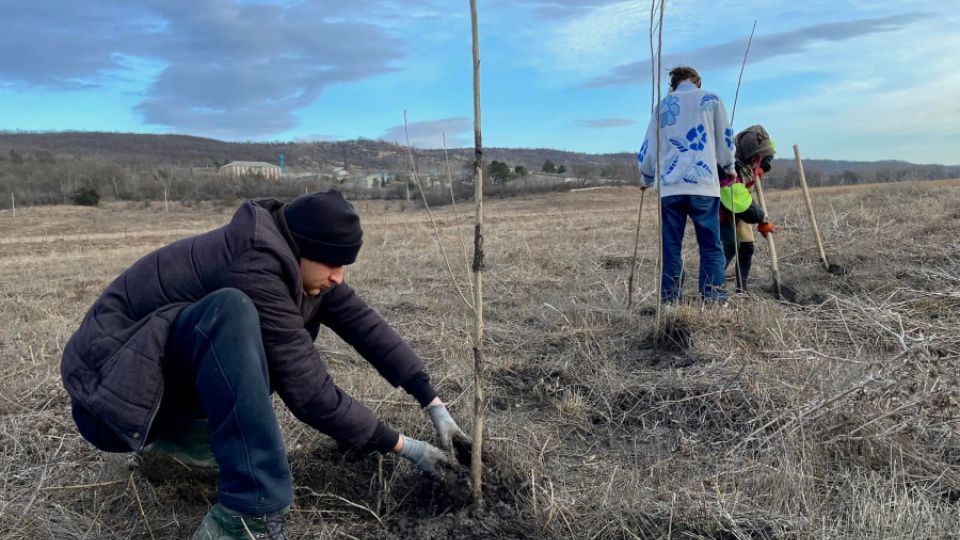Despite the chilly weather, sixteen volunteers gathered at an event organized by our Moldavian colleagues in the Bălăbănești community on March 12th. They arrived to help with planting trees on the right bank of the Bălțata River. The event is a part of Bioticaʼs long-term afforestation and community engagement effort. Once a forested country, woodlands now cover only a tenth of the territory of Moldova because of the intense agriculture and logging in the past. Arnikaʼs project coordinator, Pavel Pinkava, explains why planting trees is an important part of the strategy: “Deforestation leads to extreme droughts and floods that increasingly affect the rural areas and their inhabitants. Planting trees along the watercourses aims at restoring balance in the countryside that suffers from weather extremes.”
Restoring childhood memories
“I remember having so much fun playing in the woods as a young boy,” says Veaceslav Covalenco from Căușeni when describing his motivation to participate in the event. “Now, we can see so many types of landscape erosion because of deforestation. I feel a duty to help the ecosystem to recover. I also like it that here I meet people who are on the same page as me and appreciate the value of nature.” He hopes that the number of volunteers, as well as the afforested territory, will expand year by year. During two planting events, Biotica and volunteers have already planted 1,300 trees this year.
Liliana Josan, the project coordinator, agrees with his words and further says: “This time, we planted mostly willows and poplars. The participants in the planting are volunteers from different locations in the country. For example, on Saturday, February 19th, there were 13 volunteers, but usually, more people who want to plant come to the events and dedicate their time to the protection of the natural environment.”
Moldovans on guard
Within their joint initiative, Arnika and Bioticaʼs activities focus on the villages around the four natural areas – Țipova, Bălțata-Bălăbănești, the Iagorlîc Reserve (Transnistria), and the Lower Dniester area – whose character is shaped by rivers.
The project, which is funded by the Transition Promotion Program of the Ministry of Foreign Affairs of the Czech Republic, will cover a wide range of support to civil society in Moldova. For instance, a group of Civic Guardians of Nature is going to be formed to prevent harmful interventions and monitor the state of the natural environment. “We aim to strengthen local communities and collaborate with the Inspectorate for Environmental Protection in order to improve and increase the number of volunteers in the environmental service,” Liliana explains.
Furthermore, 4,900 trees in total will be planted to help protect small riversʼ ecosystems. There are also other integral activities of the project – the installation of artificial nests, workshops for local communities, and commemoration of significant dates such as International Earth Day or Big Jump 2022. Altogether, the Moldavian rivers shall be perceived as an invaluable heritage that protects local communities against the extremes of weather and the impact of climate change. Therefore, they deserve to be protected for future generations.








